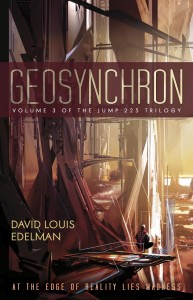Ever since Infoquake hit the stores in 2006, I’ve felt this subconscious urge not to discuss the meaning and symbolism behind my Jump 225 trilogy. Perhaps there’s some Holy Writ which demands that authors remain mysterious about their own work. Certainly keeping mum encourages people to come up with their own interpretations — but why should discussing things discourage people from doing so? Are my readers really so obtuse that they’ll just stop reading if I tell them directly what I intended? Am I afraid that talking about the handwaving behind the curtain will dispel the magic onstage?
Since I’ve received a number of comments and emails asking me about the ending of Geosynchron, I’ve decided to open up about it and discuss it here. Oh yeah, in case you haven’t figured it out, thar be spoilers ahead.
 Let me start with a comment by Jason in a previous post:
Let me start with a comment by Jason in a previous post:
…[T]urning Natch into a deaf, mute, blind, retarded person did not seem to have a point. The explanation of the role of the autonomous minds felt like half of an explanation because no time was spent explaining how or why they function the way they do. They appeared to be basically, magical, especially in regards to their connection to the Pharisees. I thought the story of the autonomous minds held immense promise and I was hopeful to learn more about their role in the history of the world you have created, so perhaps this is why I feel so let down by the explanation you gave. I feel like I completely missed something either much earlier in the story or even within the last book that would have helped me understand your intent in telling this final part of Natch’s story in the way that you did.
Regarding Natch’s fate: if you think about possible endings for Natch using a(n almost MultiReal-like) process of elimination, you’ll see that there are not many other fates that work for the character. The whole point of the character is for him to go from a state of complete selfishness to a state of complete selflessness. He begins Infoquake callously threatening all of civilization with a fake black code attack; he ends Geosynchron sacrificing everything he knows and loves to prevent an Autonomous Revolt-style catastrophe that threatens humanity.
Natch is presented as a character of limitless drive and desire (see my Big Idea piece on John Scalzi’s Whatever blog for more about that). By the end of MultiReal, he’s achieved everything he ever wanted, or at least everything he always thought he wanted: freedom to explore his programming with virtually unlimited funding, without constraints of government or society. Not only that, but he’s got a program under his command that lets him find the best of all possible worlds with every decision. But he soon sees the emptiness behind these goals, and finds himself in the complete opposite position at the beginning of Geosynchron: trapped in the Patels’ dungeon, unable to move forward, unable to do anything except sit and wait for the world to do what it wants to him. Achieving everything he wanted has led him… nowhere.
Where can Natch go from there?